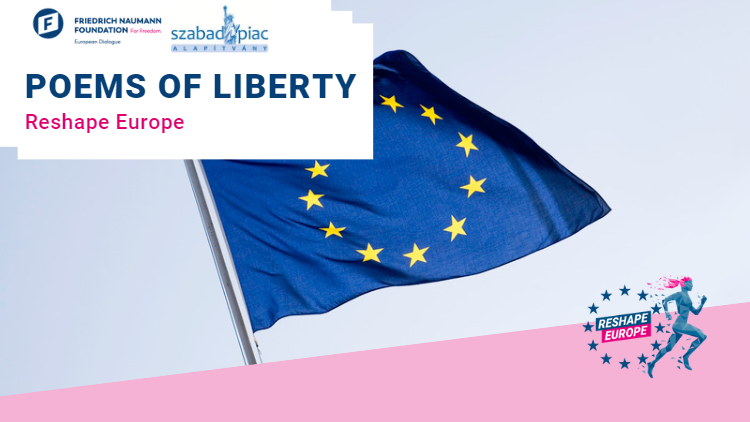Reshape Europe
Poems of Liberty: Reshape Europe

Europe is facing a multitude of serious challenges: Earlier this year, Russia invaded Ukraine and has since led a war of aggression that is impacting Europe as a whole. In addition, the European Union and its Member States are still grappling with the consequences of the global health crisis. Within its own borders, anti-democratic populism and illiberal developments are challenging the EU as a self-proclaimed “community of values”. In the new world order, which is characterised by the strategic rivalry between authoritarian states on the one hand and liberal democracies on the other, these are alarming signals. Whether Europe succeeds in facing up to these challenges is, therefore of global significance. While the values of liberal democracy are under threat, the EU, as a unique area of peace, prosperity and common law, has a special responsibility to defend the model of liberal democracies. To this end, it must be strengthened- both internally and externally. Now is the time to show that free and democratic societies are best equipped to master major challenges.
This edition of “Poems of Liberty” was created as part of the FNF “Reshape Europe” campaign, which is a global dialogue on how Europe can become more resilient in order to stand up to the enemies of freedom worldwide. We also take a step back and explore how the EU has gotten to its current form and what the rest of the world can learn from it. To connect history and the present, we will take you through four defining areas of the EU with poems by renowned authors and contemporary commentaries.
In “A Europe of History”, we explore the EU as a historical project. On the one hand, Europe was built on revolutions and uprisings, as Percy Bysshe Shelley tells us in “Political Greatness”. On the other hand, Dezső Kosztolányi in his poem “Európa” paints us a picture of how the EU is also about overcoming our differences and creating a unity that is nowhere else to be found among that many states. Even though challenges remain, we should not forget that this project is alive and in continuous development, which requires commitment from all its members.
“A Europe of Economic and Social Development” takes us on a journey of European growing pains and achievements. Carl Sandburg’s “Work Gangs” is a visual account of how enhanced globalisation and trade benefit our societies and opens up ground for discussions on the wider implications of global responsibility that the EU faces today. In “Song for Equal Suffrage” by Charlotte Perkins Gilman, we take stock in the history of promoting gender equality and thriving towards a Union of values, while also leaving room for critical reflection on what still needs to be done to achieve it.
Recognising that today’s social, political and economic climate can, at times, be volatile and polarised, we take a step back in “A Europe of Challenges” to reflect on recent challenges and how the European Union got together to overcome them. Addressing our internal struggle, Frances Ellen Watkins Harper’s “Aunt Chloé’s Politics” reflects on the issues of corruption and rule of law that some Member States have been struggling with in recent years. In “End of the World”, Jakob van Hoddis also invites us to think about a threat that has found its way to the top of the European Commission’s priority list in recent years: climate change. While giving space for a critical reflection on the European Union’s actions in the face of these vital challenges, we also highlight how it has managed to address them and create innovative and leading solutions.
Finally, “A Europe of Peace” addresses the war in Ukraine and the European Union as a successful peace project. With Martin Greif’s “Peace!”, we can reflect on this achievement and the current threats that it faces. Even though there is no war within the EU, the resilience of the bloc is put to a test, as it has nevertheless become involved through its sanctions packages, aid to Ukraine, as well as the social and economic effects of the war on the Member States.
To visualise some of the benefits and most burning questions about the EU, the content of this edition is complemented by two comics by our Animate Europe artists. Animate Europe started out as a biannual comic competition by the FNF European Dialogue and has since evolved to cover a variety of current topics, such as disinformation and media literacy, to promote political education through this engaging and accessible medium.
We hope you enjoy this edition and wish you a good read!

